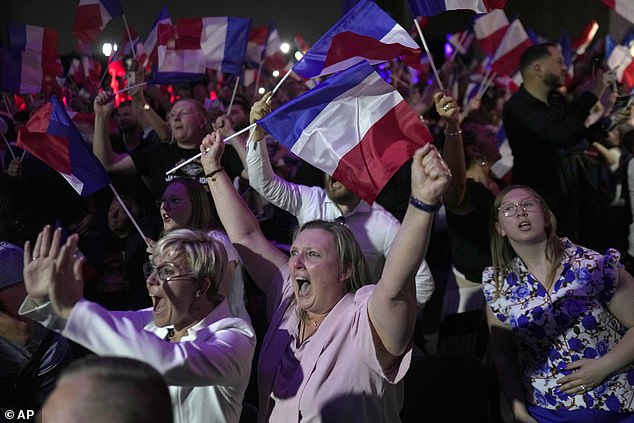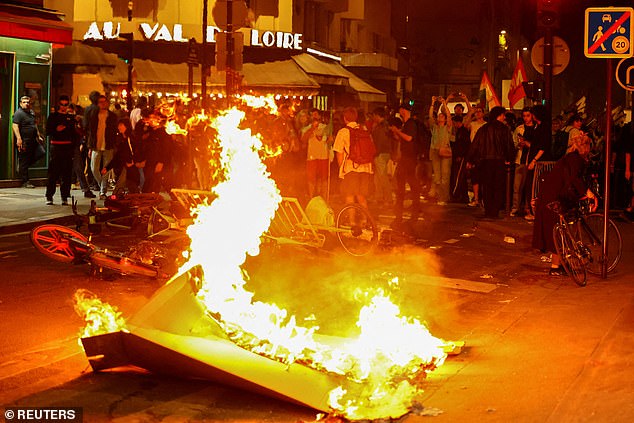JONATHAN MILLER: The four bleak scenarios now facing France as it teeters on the brink of violent chaos
Aux armes, citoyens! These famous, bloodcurdling words from La Marseillaise, the French national anthem, call for armed uprising amid the tumult of revolution.
But they could also be a foretaste of the near future for France, a country on the brink of collapse.
There are five days left to save not only Emmanuel Macron’s presidency, but also the country’s political stability.
The president himself has admitted that France is heading for chaos, riots and even civil war if Marine Le Pen and her right-wing nationalists win a large majority in the National Assembly this weekend, which seems very likely.
Parisian shops and government offices barricade their premises. Police leave revoked.
It seems overwhelmingly likely that Marine Le Pen and her right-wing nationalists will win a handsome majority in the National Assembly this weekend

On Sunday evening, thousands of left-wing demonstrators took to the streets in Paris and other French cities to protest Le Pen’s victory
Macron has already thrown away his majority in the National Assembly thanks to last Sunday’s hastily called general election, in which his Renaissance party (formerly En Marche) and its coalition partners were humiliated by Le Pen’s Rassemblement National (RN).
Now the French sans-culottes are preparing for a second, decisive round of voting that will determine the final allocation of parliamentary seats.
The polls show Macron heading for another crushing defeat – and the potential for bloodshed or worse, as far-left agitators rebel against rising right-wing support.
This is no exaggeration. France remains proud of its revolutionary past, in which the Ancien Régime of Louis XVI was overthrown by the people – with the terrible help of the guillotine.
In recent years, the country has seen an increase in violence and social unrest, including the 2005 riots in the suburbs of Paris and the long-running “yellow vests” movement.
On Sunday evening, thousands of left-wing demonstrators took to the streets of Paris and other French cities to protest Le Pen’s victory.
Millions of visitors flocking to the Olympic Games in just over three weeks could be more likely to encounter street fights and the stench of tear gas than nonchalant waiters and expensive pastry chefs.
But if Macron – often described as the reincarnation of Napoleon – has finally met his Waterloo, he has only himself to blame.
It was his own impulsive choice to dissolve the National Assembly after his party performed poorly in last month’s European Parliament elections.

A barricade is set on fire as protesters protest against the National Struggle Party
The president gambled that French voters would turn decisively away from Le Pen in the general election (rather than the European elections), but he lost, decisively.
There are four likely scenarios for this weekend’s vote count, and all of them are worrying.
The first – and most likely – is that Le Pen’s RN wins again, but narrowly fails to secure an absolute majority.
This is a recipe for political disaster. The French parliament will be thrown into chaos and the country will become ungovernable.
Why? Because if no government is formed, the unelected “Council of State,” made up of retired politicians—many of them Macronites—would oversee the day-to-day running of government but would have no power to implement new measures. This would mean political paralysis, financial turmoil, voter frustration—and, given the yawning democratic deficit, quite possibly street fighting.
The second case is that the RN does win an absolute majority and forms a government – but this provokes a widespread uprising of the so-called ‘black bloc’ of the hard left. Again, widespread violence, looting and attacks on the police can be expected.
Left-wing unions have already threatened strikes if the Royal Navy wins, which would bring public transport and government services to a standstill.
Hundreds of civil servants have vowed to disobey such a government, which they hysterically call “fascist.” The third scenario is even worse. In it, the left, full of extremists, wins a majority by making shady deals behind closed doors with the remnants of Macron’s battered party.
This too guarantees political instability, because it would be a direct rejection of the democratic choice of the voters.
However it is achieved, a left-wing victory is likely to plunge the country into financial crisis as jittery bond markets withdraw support for the country’s nearly €3 trillion in government debt.
This will inevitably only increase the likelihood of social unrest.
Finally, there is the sinister possibility that a desperate, cornered Macron will declare a “state of emergency” and seize absolute power for himself under Article 16 of the Constitution, while warning of armed conflict.
I’m not exaggerating: even Macron admits that France is a powder keg.
In a bizarre podcast interview last week, the president claimed his political opponents had stoked tensions between communities and “imposed power.”[ed] people towards civil war’.
But if there is anyone who is bringing the country into conflict, it is Macron.
The one-time wonderboy of the globalist consensus, memorably depicted on the cover of The Economist magazine on the water, now watches his legacy drown in the polluted waters of the Seine.
The outcome of last Sunday’s vote speaks for itself. His centrist political philosophy, based on his own personality, is at an end.
How bitterly must Macron now regret his vain decision to call the elections. Was it just a gross political miscalculation, a bet that went terribly wrong?
Or, I wonder, has some deep-seated narcissistic character flaw caused Macron to lose touch with reality?
The president is certain that he is intellectually superior to others. Early in his presidency, he warned that his thoughts were “too subtle” to be understood by mere mortals.
Macron famously compares himself to Jupiter, the king of the gods, and considers himself special and unique, a man who can only be understood by other special or high-ranking people. This attitude has brought him much good.
France, where I have lived for over 20 years, is a beautiful country that has given the world much in terms of culture, science and art.
But time and again, the country has been plunged into the abyss by the vanity, incompetence and carelessness of its leaders, including Louis XVI (who had a fateful rendezvous with Madame Guillotine), Napoleon and the Nazi collaborator Marshal Pétain, to name but a few.
Macron’s career ended in both personal failure and national catastrophe, and is now following the same dark path.
